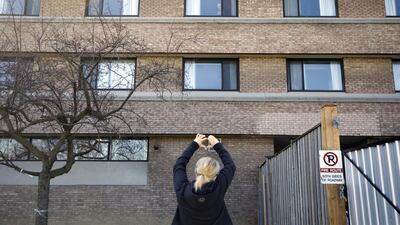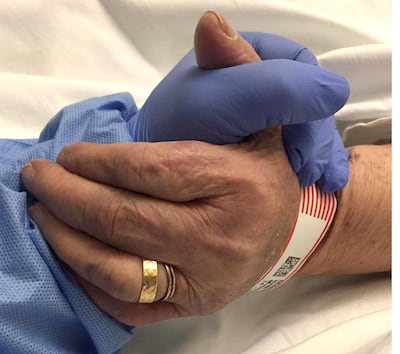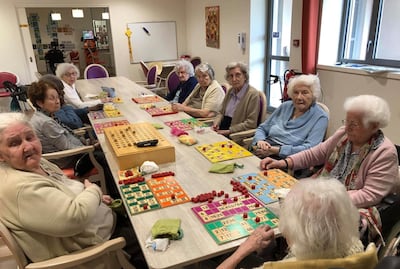It is clear by now that coronavirus is deadlier for older people. Out of more than 37,000 Covid-19 deaths as of May 1 in the US, nearly 30,000 – or 80 per cent – are over 65.
Of course, this does not mean people in other age groups should not be vigilant. Younger people can infect elderly relatives, and they themselves can also die of the illness or experience severe symptoms. When they are hospitalised, they put more pressure on fragile healthcare systems.
But the outsize impact on the elderly has been a consistent narrative as the crisis has unfolded and led to immeasurable pain in families around the world. How many sons and daughters and grandchildren had to say goodbye to parents and grandparents from behind the screens of an iPad, robbed of the chance to say a final farewell, or a last kiss on the cheek?
And it turns out that while families were mourning at home, a monumental tragedy was taking place in elderly care homes here in my adopted home of Canada and elsewhere in Europe and the US.
In April, the Montreal Gazette published an investigation that found that more than two dozen deaths had taken place at the Résidence Herron, a nursing home in the city, between late March and early April, rising exponentially as the pandemic exploded in the province of Quebec.
The spike in cases took place after staff who were not provided with protective equipment deserted the home because of infections among residents. When a local nurse visited the Herron, she found residents dehydrated, unfed and covered in excrement.
While the Herron is a particularly horrific and undignified example that is now the subject of multiple investigations, the problem appears to be systematic.
In neighbouring Ontario, the second hardest-hit province in Canada, three quarters of the 1,300 people who died are nursing home residents, and there have been around 200 outbreaks in those homes, according to the Canadian Broadcasting Corporation. And 80 per cent of all coronavirus-related deaths in Canada are connected to long-term care and seniors’ homes, which is much higher than the rest of the world.
This trend is hardly unique to Canada, though they are particularly egregious there. In Europe, the World Health Organisation estimates that up to half of all coronavirus-related deaths occurred in nursing homes, describing it as “an unimaginable human tragedy”. That figure is around 40 per cent in Italy, and horrific stories of abandoned residents and corpses have emerged in the US and Spain.
The issues are broadly similar, from a lack of protective equipment and proper training and pay for staff, to conditions ripe for outbreak, including an especially vulnerable population. In Canada, care for the elderly is not regulated by the government to the same extent as other healthcare facilities, meaning they have less oversight.
In many countries, visits to nursing homes have been banned, leaving relatives to die alone and in fear. But as these states raced to shore up hospital beds and ICU capacity, they seem to have overlooked one of the most vulnerable corners of society, with terrible consequences. There will be many more deaths in these homes battling outbreaks and death tallies will keep being revised upwards as older cases are uncovered.
It may be tempting for Middle Easterners to argue that this is an institutional failure of the West, with its emphasis on individualism and the nuclear family. In the Arab world, we take care of our elderly. And there is value in holding on to this social tenet – of looking after our parents and grandparents ourselves, particularly in a time of crisis. Though perhaps it is dangerous to take for granted the status quo. With upheaval throughout the region, more and more people are seeking a life abroad – and extended families are increasingly left behind in broken countries with impoverished healthcare systems. It is unclear if the extended family model will survive for another generation at this rate.
In Canada, calls are mounting for integrating long-term care homes into the framework of the country’s vaunted healthcare system, ensuring that never again could a scandal like this recur by placing responsibility for the well-being of residents directly in the government’s hands.
I don’t know the answer to the pressing policy questions concerning nursing homes, and at any rate these might have to wait until investigations are complete and blame can be properly attributed – cold comfort as that may be for the families that have lost loved ones in this pandemic.
But the scale of the scandal strikes me as a betrayal of our supposed commitment to the value of individual human life, and requires solutions that are fundamental, in addition to the policy prescriptions. One avenue is a renewed emphasis on the value of caregivers – in nursing homes and beyond.
Too often have we realised that the heroes keeping our world going, like the delivery men and women, the cashiers at the supermarket, the nurses in the hospitals, and the staff at nursing homes, whose job is to show up every day and care about our loved ones, are not valued. They are underpaid, and their jobs are perceived as low on the economic ladder, not requiring adequate compensation or honour.
The fact that we did not value the work of caregivers at nursing homes shows us the kind of society we were before the pandemic – we valued ephemeral consumerism over the ties that bind. We did not value those who cared for us, whose job was the perpetuation of human connection and intimacy.
We need to fix that broken model now, so we may build a gentler society. Our lives, and those of our parents and grandparents, depend on it.
Kareem Shaheen is a former Middle East correspondent in Canada
Follow The National's Opinion section on Twitter




